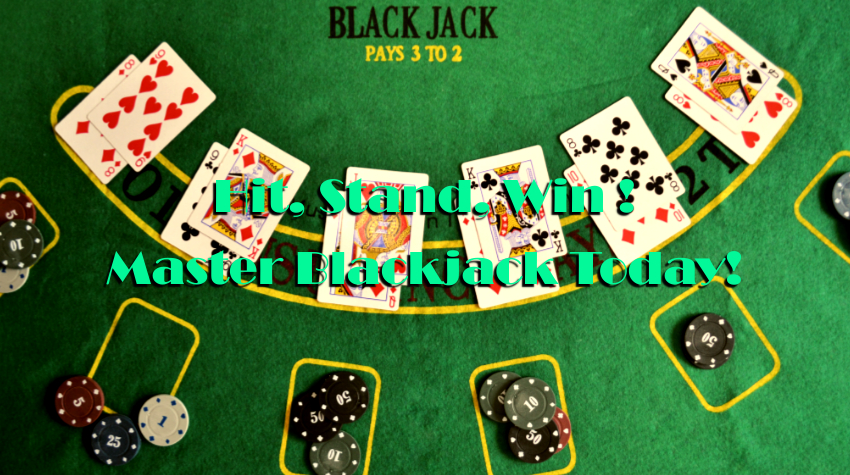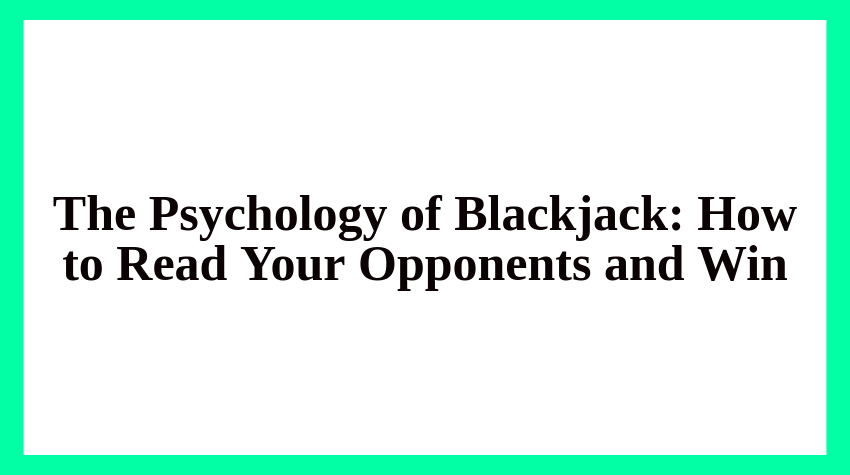Blackjack is more than just math and luck—it’s also, importantly, a mental game. While the cards might be random, how you respond to pressure, read other players, and manage your emotions can ultimately impact your success. Whether you’re playing online or at a land-based casino, understanding the Psychology of Blackjack can therefore help you stay one step ahead. In this guide, we’ll explore how psychology plays a crucial role in blackjack and why mastering your mind can significantly improve your overall play.
The Mental Side of Blackjack
Emotional Control at the Table
In blackjack, your worst opponent can be yourself. Players often make poor decisions when they’re emotionally reactive—tilting after a loss, chasing wins, or getting overconfident after a streak.
Key psychological triggers to watch out for:
- Frustration after a loss: May cause reckless bets.
- Excitement after a win: Can lead to overbetting.
- Impatience: Often results in poor hand decisions.
Staying emotionally balanced allows you to stick to your strategy. Practice breathing techniques or take short breaks to clear your head during intense sessions.
The Power of Focus
Blackjack is fast-paced. Each decision counts. If your mind wanders, you could make a costly mistake—hitting when you should stand, forgetting the count, or misreading the dealer’s hand.
To stay focused:
- Eliminate distractions (especially in online games).
- Set a specific time limit per session.
- Stick to a plan instead of making spontaneous plays.
Observing the Dealer: Tells and Behavior
Can You Read a Dealer?
While blackjack dealers follow strict procedures, they are still human. Some may unconsciously reveal emotional cues—called “tells”—especially in live games.
Examples of dealer tells:
- Smiling or pausing when holding a strong hand.
- Faster dealing when they have a weak hand.
- Eye contact avoidance when about to bust.
These cues are subtle and not guaranteed, but paying attention may offer an edge—particularly in live blackjack environments or physical casinos.
The Dealer’s Upcard Psychology
Reading the dealer’s upcard is part strategy, part psychology. A face card or ace can make you nervous. A weak card like a 4, 5, or 6 may give you false confidence.
This mental tug-of-war can cloud judgment. The trick is not to overreact. Trust your basic strategy rather than panicking or getting greedy.
Reading Other Players (Even in Online Blackjack)
Table Dynamics in Multi-Player Games
In land-based and multiplayer online blackjack, your fellow players can influence your choices. A nervous player who always hits might throw off your rhythm. Someone betting aggressively could pressure you to keep up.
Common player behaviors to observe:
- Players who hesitate often lack a plan.
- Overconfident players may bust more often.
- Emotional players chase losses and break table etiquette.
If you notice these patterns, don’t let them pull you away from your strategy.
Predicting Behavior in Online Games
Even online, player psychology plays a role. Many platforms now offer live dealer blackjack, where real-time decisions and interactions come into play. You may spot habits like:
- Players who always double down regardless of situation.
- Someone who surrenders quickly after a tough hand.
- Time-takers vs. impulse clickers.
All these patterns offer insight into how players handle stress, odds, and expectations.
Mastering Your Own Mindset
Confidence Without Arrogance
Confidence helps you play your best game. But arrogance leads to sloppy decisions. Trusting your preparation and knowledge should empower you—not blind you.
Healthy confidence comes from:
- Studying basic strategy
- Practicing with free games
- Accepting losses with grace
When you’re grounded in knowledge, you’re less likely to tilt and more likely to spot mistakes early.
Handling Winning and Losing Streaks
Streaks are emotional roller coasters. During a winning streak, adrenaline surges. You feel unstoppable. During losing streaks, despair can creep in.
Psychological tips for streaks:
- Set a “walk away” win goal and stick to it.
- Use stop-loss limits to prevent chasing.
- Stay neutral—wins and losses are part of the game.
Being emotionally consistent keeps your decision-making sharp and prevents irrational bets.
Bluffing and Table Image in Blackjack
Bluffing in Blackjack?
Unlike poker, blackjack isn’t a bluff-heavy game. However, in social settings or casual games, you can still use psychology to influence others—especially in games with side bets or shared information.
You can bluff your confidence, experience, or even hand knowledge to nudge others into poor decisions. While not always practical, this adds a fun, mental layer to live or group blackjack play.
Controlling Your Table Image
Whether in a casino or on a live platform, how you present yourself affects how others treat you. If you’re seen as composed, experienced, and calm, opponents are less likely to provoke or distract you.
To manage your table image:
- Avoid excessive celebration or frustration.
- Be consistent with your betting.
- Project calmness even in tough hands.
Psychological Tips for Online Blackjack Success
Tip 1: Set a Mental Routine
Before you play, establish a mindset checklist:
- Am I rested?
- Do I feel focused?
- Am I ready to follow my plan?
This mental habit keeps you prepared and reduces reaction-based play.
Tip 2: Know When to Quit
Online blackjack can be immersive. It’s easy to lose track of time or chase a win. Always pre-define:
- Maximum session time
- Budget limit
- Emotional threshold (tilt alert)
Knowing when to stop is a psychological advantage over the average player.
Learn the Basics First: Blackjack Strategy
Before diving into advanced psychology, make sure you’ve mastered the fundamentals. Understanding when to hit, stand, double down, or split is critical.
To refresh your basics, check out our beginner’s guide:
👉 What Is Blackjack?
Blackjack Psychology vs. Other Casino Games
Blackjack vs. Slots
Slot machines require little decision-making, and there’s no bluffing or reading involved. Blackjack, however, blends logic and psychology.
Blackjack vs. Poker
Poker is more psychological than blackjack, relying heavily on bluffing and deception. Still, blackjack requires mental sharpness, discipline, and reading ability—especially in live environments.
🎯 Conclusion: Mastering the Psychology of Blackjack

\ Hit, Stand, Win! /
The psychology of blackjack isn’t about outsmarting others with tricks—it’s about mastering your mindset, observing human behavior, and staying emotionally balanced. Whether it’s recognizing a dealer’s subtle tell, resisting the urge to tilt after a loss, or staying calm when the stakes rise, your mental game matters.
If you’re serious about improving, start by practicing your awareness, developing emotional control, and sticking to strategy—not gut instinct. Over time, these psychological tools will become just as valuable as your card-counting skills or betting tactics.
Want to explore more expert tips and casino game guides?
Visit Casino Savvy—your go-to hub for smart, strategic casino play.









Comments